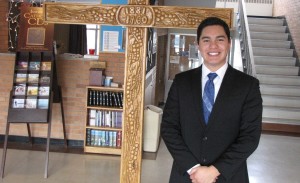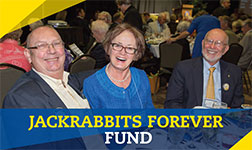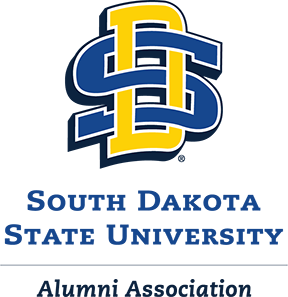
Roberto Peñaloza Valencia stands inside an electronics laboratory at Daktronics Engineering Hall. He became interested in renewable energy as a sophomore in high school.
Roberto Peñaloza Valencia’s background includes plenty of markers that could signal academic disaster:
• Didn’t speak a word of English when he came to the United States at age 6 as a first grader.
• Family moved five times in five years upon coming to the U.S.
• Parents, who worked in manual labor, were in the U.S. on work visas, biological father remained in Mexico.
• Was bored in school.
That’s not the foundation one would expect for a student who graduated in May 2022 with a 4.0 GPA and a bachelor’s degree in electrical engineering from South Dakota State University.
But that is the story of Peñaloza Valencia, who also graduated without any college debt and has taken a job in energy storage with Burns and McDonnell in Kansas City, Missouri.
“My story definitely has a lot to do with hard work and having the right people in my life push me toward being a better person and student,” Peñaloza Valencia said.
Family bounced around several years
His story begins in Querétaro, the capital city of a state by the same name in north-central Mexico. In 2006, the family—mother Marcela Valencia, stepfather Gabriel Mejia, 9-year-old brother Arturo and 4-month-old sister Marcela—hit the road to find a better life north of the border. The parents had work permits and jobs at a meat packing plant in Sioux City, Iowa.
Next stop was the Houston area. After a short time there, it was back to the Midwest to Canistota where Mejia worked at a dairy.

The family of Marcela Valencia and Gabriel Meija gathered at Discovery Green in Houston during the Christmas season. Pictured, from left, are Marcela Mejia Valencia, Roberto Peñaloza Valencia, Marcela Valencia, Gabriel Meija, Gabriella Mejia Valencia, Courtney Valencia and Arturo Valencia.
After a year, the family moved and settled in Hartley, Iowa, where Mejia worked in another dairy. Stability came when the family moved to Elkton in summer 2011 to work at a dairy. Mejia now does mechanical maintenance there. Marcela Valencia prepares meat products at the Elkton Locker.
Sister Marcela Mejia Valencia is 16 and just finished her sophomore year at Elkton and Gabriela Mejia Valencia is 13 and just finished seventh grade.
Family’s second college graduate
Shifting from school to school in a household where Spanish is the dominant language has derailed many students’ academic effort; not so for the Valencias. Arturo graduated from SDSU in December 2020 with a degree in mathematics, secured a job with Sanford Health as an applications support analyst, and is enrolled in computer science at Dakota State while continuing to work full time.
The sisters also are focused academically, especially Marcela.
Their parents learned English through immersion; the children through school, which was never a challenge.
“Until middle school or high school, I talked a lot in class. I was bored and talked with other classmates. I can distinctly remember being at a sixth grade parent-teacher conference. The teacher told my mom I talked a lot in class. I kind of laughed. My mom looked at me and said, ‘that’s not funny,’” Peñaloza Valencia said.
That took care of his social issues at school. Academics were never a problem, and he never remembers having any difficulties in picking up English.
Dual credit courses put Peñaloza Valencia ahead
Beginning his junior year of high school, Peñaloza Valencia enrolled in dual credit classes and completed 41 credits by the time he entered SDSU in fall 2018. Working online, he completed all the generals, Precalculus, Calculus I and Calculus II, and took Chemistry 112 on campus.

Roberto Peñaloza Valencia poses inside the Newman Center adjacent to the SDSU campus. He said his senior year was marked by a growing faith.
“The most I took in one semester was 11 credits,” he said of his online learning, which was in addition to his studies at Elkton High School.
“It helped me academically and financially,” said Peñaloza Valencia, who was able to take relatively light loads in college and still graduate in four years. But a light course load didn’t mean a light schedule. His freshman year he worked about 20 hours per week as a customer service representative at BankStar Financial and a cook at Applebee’s.
By his sophomore year, he was working in a field closer to his major, doing project management initially and hardware design after seven months at Daktronics.
In May 2021, he started an internship working remotely for Ulteig Engineers. In 2020-21, he was a community assistant in Mathews Hall on the engineering floor, and this year he was a community assistant in Abbott Hall, which provided free housing and a meal plan.
Taking that route, he will graduate with no college debt. “Graduating with no debt is one of my greatest accomplishments,” he said.
Receives 3 prestigious scholarships
As a DACA (Deferred Action for Childhood Arrivals) student, he isn’t eligible for federal financial aid or any scholarships that require U.S. citizenship.
“That made me look harder for scholarships, which I was fortunate enough to receive. All of my college was paid for through scholarships and working,” said Peñaloza Valencia, who received three prestigious scholarships his senior year.
He received a $2,000 national Tau Beta Pi Honor Society Scholarship, the college’s Center for Power Systems Studies $6,000 scholarship and a $2,500 Future Innovator Scholarship from the Institute for Electrical and Electronic Engineers.
Took early interest in renewable energy
 Electrical engineering has been Peñaloza Valencia’s academic focus since his sophomore year at Elkton, when an older friend headed to State for electrical engineering.
Electrical engineering has been Peñaloza Valencia’s academic focus since his sophomore year at Elkton, when an older friend headed to State for electrical engineering.
“At the time, I was getting into renewable energy and sustainability. I considered majoring in chemical, mechanical or electrical engineering, but felt l could do the most with renewable energy in electrical engineering. My desire is to work with solar energy and energy storage. I hope to get an electric vehicle in one to two years,” he said.
In his sophomore year at State, Peñaloza Valencia specialized his studies in power systems, which has a long history of success.
When asked what stands out most about his experience at SDSU, Peñaloza Valencia said, “The growth that I’ve seen in myself over the years. I had heard that electrical engineering was a hard major, but I had also heard dual credit courses would be hard and I got through them. Circuits II in my sophomore year was the first engineering class I struggled with … It made me study a lot to make sure I finished with the grade I wanted.”
4.0 was goal
That was a cumulative 4.0 goal at SDSU.
“From the start, I had always heard that electrical engineering was hard, but I knew people had graduated with a 4.0 before. I figured if they could do it, so could I.” he said.
In June, Peñaloza Valencia began working in energy storage at Burns and McDonnell, an employee-owned firm of 7,600 engineers, architects and construction professionals.
He will be able to apply what he has learned in his engineering courses. But he also will apply other intangible lessons he has learned at SDSU, such as perseverance, delayed gratification and depending on others to help you reach a goal.
That’s something that will make Marcela Valencia, Gabriel Mejia and Roberto Peñaloza Vega very proud.
–Dave Graves






